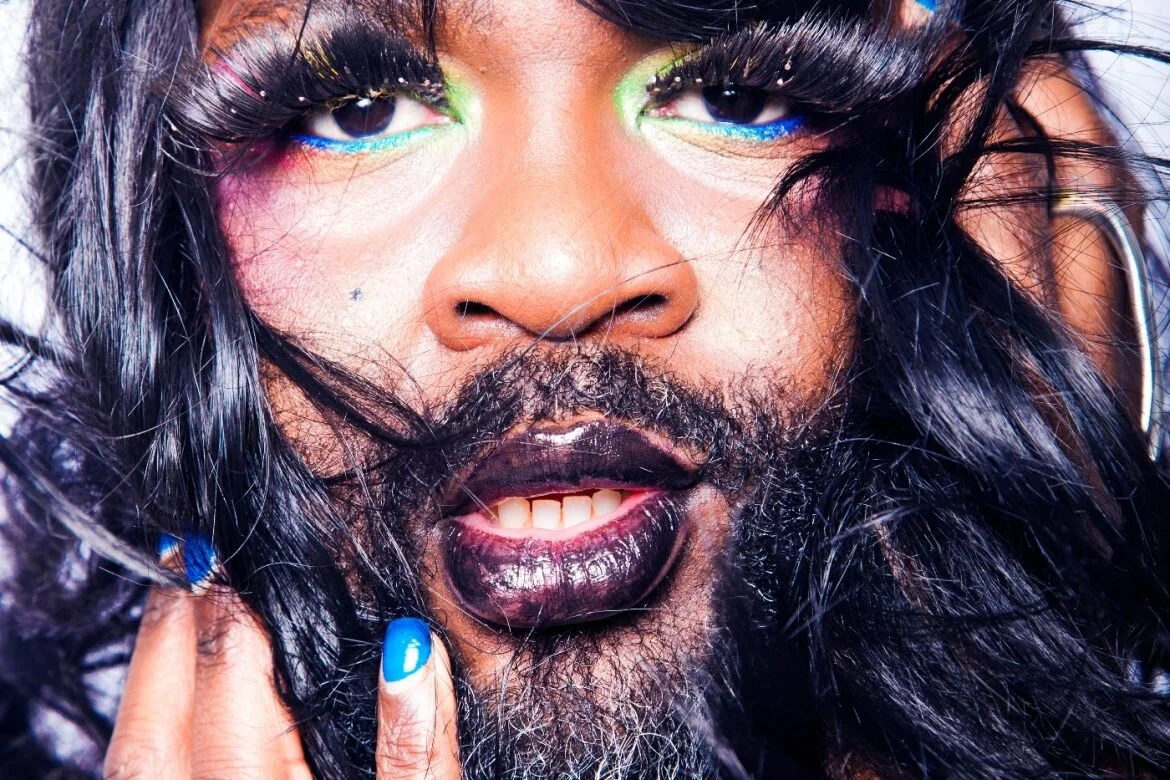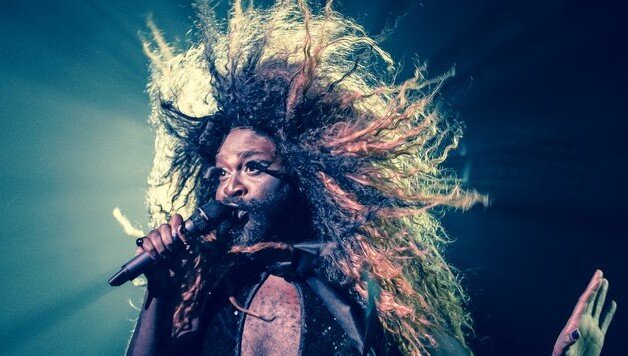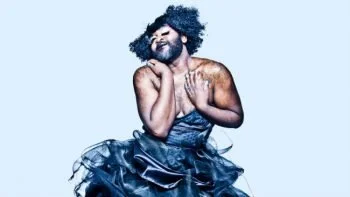At the TRANSFORM Cabaret Festival, Le Gateau Chocolat takes drag into unexpected terrain
Depression, racial justice, and Olivia Newton John: the British-Nigerian star with the operatic baritone is not afraid to go there.
Le Gateau Chocolat likes to “blindside” you with a show that delves into the political, the camp, and the deeply personal.
Le Gateau Chocolat performs at the TRANSFORM Cabaret Festival, streamed via thecultch.com on September 26 at 12 and 7 p.m.
YOU COULD START by describing Le Gateau Chocolat as a larger-than-life, spendidly bearded Black drag diva, but that only scratches a fascinating surface.
He was raised by a conservative family in Nigeria, moved to Britain, and studied law. And he’s blessed with a rafter-shaking operatic bass-baritone, as magnificent singing contemporary opera as Olivia Newton John’s “Xanadu”.
But what might be most amazing about Chocolat is how he defies categorization--as do the shows he’ll stream here as part of the Cultch’s digital TRANSFORM Cabaret Festival this year.
His Icons explores the songs and influences that made him who he is, while a second piece commissioned by the fest explores the journey he’s been on through during the world’s last tumultuous six months. In both, he serves up wildly boundary-breaking cabaret--as likely to tell a moving story about falling in love or battling depression as he is to re-enact dancing in his bedroom to Madonna as a teenager. Throughout, he puts his golden voice to the work of everyone from Luciano Pavarotti to Kate Bush--not the sort of playlist you’d await at your local club’s drag show.
“Especially if you were coming expecting clowning or court humour, there’s always an interesting excitement or naughtiness,” says the affable, articulate artist. He’s chatting over Zoom, sitting in his Brighton living room in a nondescript hoodie that contrasts the sequins, false eyelashes, and voluminous wigs of his stage show. “That gives me the great opportunity to blindside you with the fact this show isn’t going to be about that. It’s about your ambitions, your hopes, your humanity. It's a wonderful thing to platform the unexpected. And that’s such a joy because, when you’re marginalized and society has traded on how you look or being a different sexuality or your colour or your size, you can use this platform to show those things that make us the same.
In Icons, Le Gateau Chocolat puts his golden voice to the work of everyone from Luciano Pavarotti to Kate Bush.
“If you embrace drag, you see it’s more than female impersonation,” he adds. “It’s clowning, it’s political commentary, it’s a mirror… There’s this supernatural space it inhabits: it’s not male, it's not female, it’s this transient, ephemeral space. It can be fantastical or really gritty.”
Chocolat stresses that becoming a drag queen was not about playing dressup. It grew out of something deeper in his identity--from skills he honed long before he came out.
“Growing up in conservative Nigeria with parents who were incredibly Christian, my drag wasn’t something I discovered putting on makeup,” he shares. “It came from my being young and being able to be whoever I had to be. With a Catholic dad and a Pentacostal mother, I was going, ‘I think I’m gay and that doesn’t really fit in.’
“If you are raised in that environment, you just become very adept at ninja drag,” Chocolat continues with a wry laugh, “at playing something where they can’t hone in on what you’re trying to hide. When I was at boarding school or at church: you’re a magpie, you build up a vocabulary, or an arsenal to deploy.”
It wasn’t till he had moved to England, and began clubbing and singing his heart out on a dancefloor, that he found cabaret.
Le Gateau Chocolat
From there he started developing more theatrical shows. For his early Black, he took inspiration from a Maya Angelou quote that still resonates in his creative process today: “There is no greater agony than bearing an untold story inside you.” Exploring racial and homophobic epithets and the loss of close friends to suicide, it also featured Chocolat’s own, nuanced rendition of “Strange Fruit”, Billie Holiday’s famous anti-lynching song.
“I felt like I wanted to talk about these things,” he says simply.
And talk about things on-stage he continues to do, albeit in 10-inch pink heels and neon eye shadow. Chocolat’s performance channels some of the subversive spirit of alt-drag performance artists like Taylor Mac and Jonny Woo. But it also works in the meticulous production and music values he’s learned from the opera and musicals world--gigs like a new Threepenny Opera a at the National Theatre, a Porgy and Bess at Regent Park, and even a rollicking rendition of Richard Wagner’s Tannhäuser at Germany’s hallowed Bayreuth Festival last year.
He’s taken his cabaret from Edinburgh to Adelaide. In more normal years he bounces back and forth across the globe, but, like everyone else, he saw all that come to a screeching halt in March. Gateau flew home from a show in Melbourne, arriving in the U.K. on the morning of total lockdown.
The sudden shift to being holed up in Brighton sent Chocolat into a funk--one exacerbated by watching the worldwide struggles of the Black Lives Matter movement on the news. “My mental health really suffered,” he reveals.
But he says creating the new work to go with the recorded Icons show for the Cultch has helped him get through the darkness.
“There’s always an element in my drag that is life-saving,” he explains. ”It forced me out of that state to make that piece. It’s a complete reflection of where I am now.”
And so to truly understand the full, complex human that is Le Gateau Chocolat, and hear his untold story, you’d best check him out in his wig and makeup. Think of drag as the opposite of disguise--or as he likes to put it in his rich baritone, “an amplification of who we are".
















